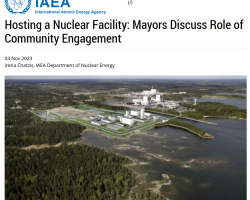Category of Content
Siting Experience Documents Only
Publication Date
Subject Matter
Keywords
Representing future generations in public participation procedures regarding the siting of a nuclear waste repository
Representing future generations in public participation procedures regarding the siting of a nuclear waste repository
State decisions regarding a repository for high-level radioactive waste have an extraordinary intergenerational significance. The academic legal discussion has increasingly strengthened the status of future generations in constitutional law. In its recent decision on the German Climate Protection Act, the Federal Constitutional Court equally emphasised that state actors have an obligation to protect future generations. Fundamental rights of future generations thus have an anticipated effect in the present.
Interim Storage, Environmental Justice, and Generational Equity
Interim Storage, Environmental Justice, and Generational Equity
With the termination of the Yucca Mountain project, which was proposed to be our nation’s first repository for the disposal of military and civilian spent nuclear fuel and high-level radioactive waste, the future of nuclear waste management and disposal in this country became increasingly uncertain. Interim storage has been advocated by many as a temporary solution while a permanent solution is studied for potentially several more decades to come.
Fostering stakeholder involvement across generations - participation after site selection
Fostering stakeholder involvement across generations - participation after site selection
In October 2022, the NEA Forum on Stakeholder Confidence (FSC) organised, in collaboration with the Belgian Agency for Radioactive Waste and Enriched Fissile Materials (ONDRAF/NIRAS), a national workshop in Dessel, Belgium, to explore the topic of stakeholder involvement across generations.
Building on previous work on this topic, participants gathered to discuss how to keep local communities involved in radioactive waste management after site selection, how to engage youth as key stakeholders and which approaches can be used to communicate with stakeholders now and in the future.
Hosting a Nuclear Facility: Mayors Discuss Role of Community Engagement
Hosting a Nuclear Facility: Mayors Discuss Role of Community Engagement
Engaging local stakeholders through transparent and open dialogue is pivotal for the success of nuclear projects. Engagement requires time, trust-building and adaptability as expectations evolve. In many places, communities that initially expressed scepticism or opposition have become advocates because of this engagement and better understanding of what it means to host a nuclear facility.
OCRWM Bulletin Fall 1995
OCRWM Bulletin Fall 1995
<p>A report from the US Deparement of Energy's Office of Civilian Radioactive Waste Management</p>
<p>Regulatory Drop Tests Planned for a Model Transportation Cask</p>
<p>Implementation Plan for the environmental Impact Statement for a Multi-Purpose Canister System for Management of Civilian and Naval Spent Nuclear Fuel Issued</p>
<p>Nuclear Waste Technical Review Board (NWTRB) Update</p>
<p>The NWTRB</p>
<p>Dry Transfer System Design Under Way</p>
OCRWM Bulletin Spring 1995
OCRWM Bulletin Spring 1995
<p>A newsletter from the Office of Civilian Radioactive Waste Management</p>
<p>Highlights Include....</p>
<p>OCRWM FY 1996 Budget Presented to Congress</p>
<p>Public Responds to Waste Acceptance Issues</p>
<p>Transportation External Coordination Working Group Convenes in North Carolina</p>
<p>OCRWM Completes Draft Public Participation Plan</p>
<p>International Program Update</p>
OCRWM Bulletin Winter 1995
OCRWM Bulletin Winter 1995
<p>A newsletter from the Office of Civilian Radioactive Waste Management</p>
<p>OCRWM Director Briefs US. Nuclear Regulatory Commission .</p>
<p>Notice of Inquiry: Technical Assistance and Training for Safe Transportation of Radioactive Waste</p>
<p>OCRWM Program Plan</p>
<p>Environmental Impact Statement Scoping for the Multi-Purpose Canister-Based System</p>
<p>Nuclear Waste Technical Review Board Update,</p>
<p>Nuclear Wasre Negotiator Update</p>
OCRWM Bulletin Special Edition August 1994
OCRWM Bulletin Special Edition August 1994
<p>MULTI-PURPOSE CANISTER PROCUREMENT: A SIGNIFICANT STEP FOR THE DEPARTMENT OF ENERGY'S CIVILIAN RADIOACTIVE WASTE MANAGEMENT PROGRAM</p>
OCRWM Bulletin Summer 1995
OCRWM Bulletin Summer 1995
<p>A newsletter from the Office of Civilian Radioactive Waste Management</p>
<p>Highlights include...</p>
<p>Westinghouse begins designing multi-purpose canister</p>
<p>DOE accepts General Atomics-9 assembly transportation cask trailer</p>
<p>Final interpretation of nuclear waste acceptance issues published</p>
WCS Files License Application with Nuclear Regulatory Commission (NRC) to Operate a Consolidated Interim Storage Facility (CISF) for Used Nuclear Fuel
WCS Files License Application with Nuclear Regulatory Commission (NRC) to Operate a Consolidated Interim Storage Facility (CISF) for Used Nuclear Fuel
WASHINGTON, D.C. (April 28, 2016) – Waste Control Specialists LLC (WCS) submitted an application to the Nuclear Regulatory Commission (NRC) for a license to construct and operate a Consolidated Interim Storage Facility (CISF) for used nuclear fuel. The filing comes after a year of pre-application meetings with NRC and maintains the timeline WCS outlined in February 2015.
The application is being led by WCS, along with its partners AREVA and NAC International, both global industry leaders in the transportation and storage of used nuclear fuel.

